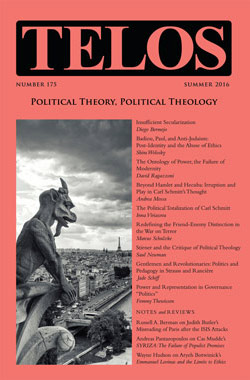Andrea Mossa’s “Beyond Hamlet and Hecuba: Irruption and Play in Carl Schmitt’s Thought” appears in Telos 175 (Summer 2016). Read the full article at the Telos Online website, or purchase a print copy of the issue in our online store.
 Those who read Hamlet or Hecuba from the specialist’s standpoint have often found it naïve, and maybe with good reason. Yet I do not want to linger on its worth or faults as a critical essay; I would rather try to read Schmitt’s book in the same way that he read Hamlet, as an eccentric writing, not completely closed, that deals with a subject matter but revolves around another one: Hamlet or Hecuba is something more than a piece of literary criticism. In Hamlet or Hecuba two concepts are applied that play a basic role at a certain stage of Schmitt’s thought; “irruption” (Einbruch) and “play” (Spiel) get their full meaning with regard to the concept of the “political” and the philosophy of history. Behind Schmitt’s interest in the interpretation of Hamlet, we can see—by means of an implicit analogy of sort—a question he is especially concerned about, namely, the “meaning in history” and its ostensible aporias. Not only does reconstructing the background help us to understand Hamlet or Hecuba, but the latter also helps us to understand Schmitt’s thought, in particular the relationship between the theological field and the historico-political one.
Those who read Hamlet or Hecuba from the specialist’s standpoint have often found it naïve, and maybe with good reason. Yet I do not want to linger on its worth or faults as a critical essay; I would rather try to read Schmitt’s book in the same way that he read Hamlet, as an eccentric writing, not completely closed, that deals with a subject matter but revolves around another one: Hamlet or Hecuba is something more than a piece of literary criticism. In Hamlet or Hecuba two concepts are applied that play a basic role at a certain stage of Schmitt’s thought; “irruption” (Einbruch) and “play” (Spiel) get their full meaning with regard to the concept of the “political” and the philosophy of history. Behind Schmitt’s interest in the interpretation of Hamlet, we can see—by means of an implicit analogy of sort—a question he is especially concerned about, namely, the “meaning in history” and its ostensible aporias. Not only does reconstructing the background help us to understand Hamlet or Hecuba, but the latter also helps us to understand Schmitt’s thought, in particular the relationship between the theological field and the historico-political one.








